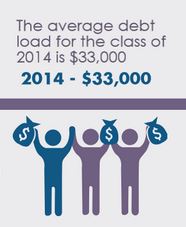 Throughout the past few years, many websites and blogs related to student loans and higher education have released lists of the things that students do so that they can afford their undergraduate education. The items on these lists range from websites like Givling.com, where users pay money to play games for a shot to win money all while funding students’ loans, to students choosing to live in a van rather than college housing.
Throughout the past few years, many websites and blogs related to student loans and higher education have released lists of the things that students do so that they can afford their undergraduate education. The items on these lists range from websites like Givling.com, where users pay money to play games for a shot to win money all while funding students’ loans, to students choosing to live in a van rather than college housing.
What I find more than strange and closer to disheartening is a journal article that I came across called “Female College Students Working in the Sex Industry: A Hidden Population.” This article recalls stories from female college students in Australia who pay their way through school by working in the sex industry as prostitutes or porn stars. These women cite factors such as rising tuition, increasing debt load, minimum wage, and decreased federal aid programs as reasons that make working in the sex industry a more attractive option (p. 2). It seems absurd that someone smart enough to attend college would choose this option, but for some they have no choice but to believe it’s the right thing to do.
A theory known as cognitive dissonance created by Leon Festinger can help to explain their behavior. Cognitive dissonance theory works off the accepted principle that individuals seek consistency among their beliefs and actions. Therefore, when individuals hold two or more contradictory beliefs or attitude, they experience discomfort and either change one of their beliefs and actions to avoid the dissonance, or ignore beliefs or evidence that contradict their beliefs to reduce the discomfort (Theory of Cognitive Dissonance, Leon Festinger).
 Female college students in the sex industry understand the negative stigma associated with their work and the majority believe that what they are doing is morally wrong. Because their actions and beliefs oppose each other, the women start to experience cognitive dissonance. To reduce dissonance, they stop thinking of their actions as wrong, and instead justify them as morally acceptable by convincing themselves that other reputable people sell sex in various ways, so they might as well sell it too. Adopting this mentality allows them to continue to work in the sex industry and alters their morals and sense of right and wrong all so that they can continue to pay for school.
Female college students in the sex industry understand the negative stigma associated with their work and the majority believe that what they are doing is morally wrong. Because their actions and beliefs oppose each other, the women start to experience cognitive dissonance. To reduce dissonance, they stop thinking of their actions as wrong, and instead justify them as morally acceptable by convincing themselves that other reputable people sell sex in various ways, so they might as well sell it too. Adopting this mentality allows them to continue to work in the sex industry and alters their morals and sense of right and wrong all so that they can continue to pay for school.
For those of you wondering, this takes place right here in America as well. In 2011, the Huffington Post published an article describing a website that will match college students or college graduates (“sugar babies”) with an older “sugar daddy” who will pay their student debt off in exchange for sex. In 2011, the site’s owner estimated that 35% of its 800,000 registered “sugar babies” were current college students using the site to pay for tuition. That’s 280,000 female college students on one website alone that are sleeping with older men in exchange for their education.
For some people, that is the price of college.
Many colleges consider themselves to be places that guide students to becoming better-rounded individuals and citizens, yet these colleges probably do not realize the hidden population of students living on their campus that use sex to pay for that education. Associations such as the Association for American Colleges and Universities (AAC&U) created a Core Commitments Moral Compass report and in the report stated that,”Collectively, colleges and universities across the country have reached widespread agreement that moral and ethical reasoning and action ought to be a significant goal for undergraduate learning” (IX). Not only do colleges agree, but 93% of the 33,000 students surveyed agreed that, ” preparing students for lives of integrity and ethical responsibility is an essential goal of a college education.” Students want leave school with integrity and ethical responsibility, but for some, affording college trumps this desire.
How can a college truly seek to serve as a moral compass that teaches personal and social responsibility, if students attending school pay their way through by prostituting themselves? I do not think it is possible. The massive amounts of student loan debt that burden today’s college students and college graduates puts many in a desperate situation that far trumps any social or personal responsibility lessons gained in college.
For the AACU to truly achieve its goal of fostering personal and social responsibility, it needs to first examine the price of education–not just the ticket price, but also the measures that students take to attend college. I do not think I can take any college seriously that claims to want to create better-rounded citizens when its tuition prices force students into horrific situations. A student, male or female, should never be put in a situation or feel they have to put themselves in a situation where they have to compromise their morals just to afford an education.
College is not worth that price.